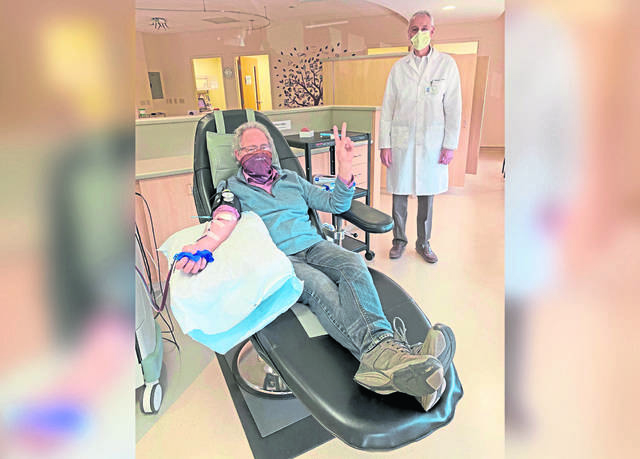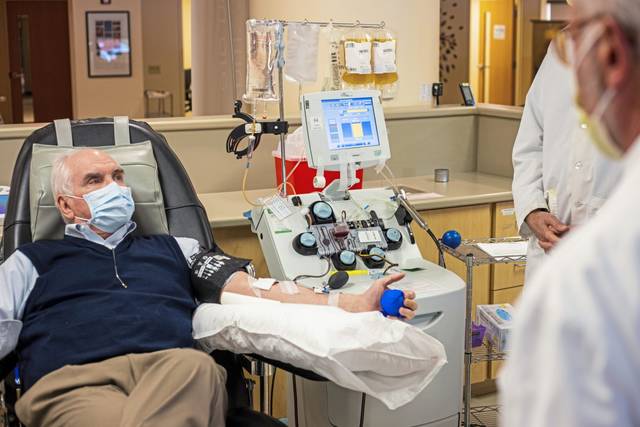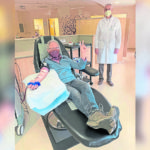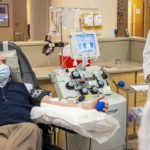Pittsburgh area doctors and blood banks are looking for blood plasma — and lots of it — from patients who have recovered from covid-19.
Blood plasma from recovered patients is being used to treat those who are fighting the disease in Western Pennsylvania and across the country.
Allegheny Health Network, UPMC and Vitalant blood bank partnered on plasma research early in the pandemic, and the results are promising, said Dr. Alan Wells, medical director of UPMC’s clinical laboratories.
“We are a leader nationally of collecting and categorizing this plasma,” Wells said.
The partnership gathered more than 800 plasma donations from more than 200 donors, and is looking for more.
“All of the early indications is that it’s helpful, but we need to find out exactly when to use it, and what dose to use it, and that can only be found out in a trial,” Wells said.
Those trials are in the works. AHN and UPMC have administered plasma to about 70 hospitalized patients.
There’s one thing slowing down the research — the relatively low number of local cases. That’s why the partnership plans to send plasma samples to Arizona, which is seeing thousands of new patients a day.
“We can enroll 10 times as many patients in Arizona as we can here,” Wells said.
Sending plasma to other states won’t prevent any local patients from getting the treatment, said Dr. Joseph Kiss, medical director of hemapheresis and blood services at UPMC.
Kiss supervises the plasma supply for the region’s medical trials.
“We are maintaining an inventory. If somebody needs it in our area, we have not said ‘no’ to anyone,” he said.
Tried and true
Plasma donations have been used to fight diseases for more than 100 years, Wells said. Infected patients create virus-fighting proteins called antibodies in their blood. Once the patients have recovered, their antibodies can be injected into other patients to help them fight the virus.
The method has been effective in reducing the symptoms and shortening the duration of other respiratory diseases, including other coronaviruses, according to Wells.
The trials currently under way are working to find out just how well it works for SARS-CoV-2, the specific form of coronavirus that causes covid-19.
Antibody tests unreliable
Testing for SARS-CoV-2 antibodies in the bloodstream can help determine whether a person has been exposed to the virus, but the results of these tests can be spotty and should not be used to make medical decisions, according to medical experts.
Local blood banks, including the American Red Cross and Vitalant, are providing free antibody tests for anyone who donates blood this summer.
The tests might provide peace of mind for those who were unable to get a traditional viral coronavirus test, which is more accurate than an antibody test, said Lisa Landis, spokeswoman for the American Red Cross Greater Pennsylvania Region.
“A lot of folks were unable to get tests, so there were a lot of unknowns,” she said.
However, these tests can provide a false sense of security, said Dr. Thomas Walsh, infectious disease clinician at AHN. False positives are common, and the presence of antibodies does not necessarily indicate immunity to the disease.
“It can lull people into a false sense of security, so that they think they can put themselves in a high-risk situation when they actually can’t,” he said.
Neither AHN, UPMC nor Excela Health is doing widespread antibody testing. However, the tests can be useful in some scenarios, such as determining whether a recovered coronavirus patient might be eligible to donate plasma.
Blood wanted
Kiss said the partnership is renewing its efforts to find donors as it plans to expand testing, ship plasma to other states and handle the local surge in coronavirus cases.
“We are still looking for people to come in, because this wave that we’re seeing right now, we want to make sure we have the inventory,” he said.
Patients who have recovered from coronavirus and have been symptom-free for at least 28 days are eligible to donate. Some potential donors are referred to Vitalant by their doctors, but people can reach out to the blood bank directly, said Kristen Lane, spokeswoman for Vitalant.
Donors can give up to once a week.
“It just gives sick patients that extra little boost they need to try to get better,” Lane said.
Early intervention
Research has shown that plasma is more effective the earlier it is administered. If a patient’s symptoms are severe enough that they require a ventilator, it might be too late for plasma to do much good, Walsch said. However, it can be very helpful for patients who have just been admitted to the hospital, he said.
So far in the Pittsburgh region, only hospitalized patients have received plasma. However, researchers are about to launch two more studies that could help treat symptoms even earlier.
Doctors soon will administer plasma to coronavirus patients in emergency rooms and nursing homes, according to Wells.
“We want to intercede at the earliest to prevent the virus from replicating, because those patients are the ones who have the hardest time generating their own immune response,” Wells said. “So we’re giving them an immune response passively to fight off the virus.”
No matter how early it is administered, plasma is not a miracle cure. It’s being tested in conjunction with medications like remdesivir and dexamethasone, which early studies have shown are effective in fighting the disease.
Wells expects blood plasma will become an important tool in doctors’ kits as they fight the virus.
“Our first drug is remdesivir, our second drug might be dexamethasone, but our third drug is going to be convalescent plasma,” he said.











